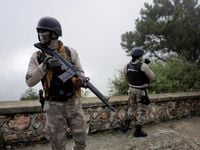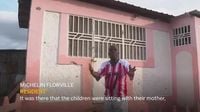On a humid Saturday night in Port-au-Prince, the heart of Haiti’s capital, tragedy struck the slum of Cité Soleil—a place already battered by years of violence and hardship. Explosive drones, reportedly deployed to target a suspected gang leader during a birthday celebration, instead unleashed devastation on the community’s most vulnerable. At least eight children were killed and six others seriously wounded in the attack, a horrifying toll that has left families shattered and sparked a storm of questions about accountability, technology, and the spiraling crisis gripping Haiti.
According to multiple reports from The Associated Press and corroborated by human rights groups, the drone strike occurred on the night of September 20, 2025, as Albert Steevenson—known locally as Djouma and suspected of gang leadership—was distributing gifts to children. The gathering was meant to be a moment of respite for the community, but it turned deadly in an instant. Residents and activists have squarely blamed the police for the attack, a charge that has not been answered by authorities. As of Monday, no official statement had been issued by Haiti’s National Police or the prime minister’s office, deepening the sense of outrage and confusion.
Claudia Bobrun, 30, lost her eight-year-old daughter in the blast. Through tears, she showed The Associated Press a video of her child lying in a pool of blood. “This is my daughter,” she said, her grief raw and unfiltered. For Michelin Florville, 60, the pain was compounded: he lost two grandchildren, ages three and seven, and his 32-year-old son. “People were running right and left,” he recalled, describing the chaos and terror that erupted as explosions tore through the neighborhood.
Another mother, Nanouse Mertelia, 37, recounted the final moments of her son’s life. He had left home just minutes earlier to fetch food. When she heard the explosion, she rushed outside and found him grievously wounded. “Come get me, come get me, please mama,” he pleaded, but he had lost too much blood. He died before they could reach the hospital.
In total, residents say at least 13 people were killed in the attack, including three civilians and four suspected gang members. The National Human Rights Defense Network, a prominent Haitian advocacy group, stated that the drones were launched as Steevenson was celebrating his birthday and distributing gifts to children. The rights group accused police of using two kamikaze drones in the Simon Pelé community of Cité Soleil, a claim that has not been publicly addressed by the authorities. The organization’s spokesperson emphasized the need for accountability, warning that such attacks “are likely to deepen public mistrust in state institutions and accelerate the erosion of governmental legitimacy.”
The use of explosive drones marks a dramatic escalation in Haiti’s fight against gangs, which now control more than 80 percent of Port-au-Prince, according to United Nations estimates. The Viv Ansanm gang coalition, which dominates Cité Soleil, was designated a foreign terrorist organization by the United States earlier this year. One of its most notorious leaders, Jimmy Chérizier—known as Barbecue—has vowed to avenge the attack, raising fears of further bloodshed.
Among the dead was St-Jean Limonthard, a 33-year-old moto taxi driver. His mother, Aglamoïde Saint-Ville, spoke of the daily anxiety she felt as he worked in a city where violence is never far away. “I prayed for him every day that he went out, and now he died in his own neighborhood coming back from work,” she said, her voice breaking as she held her son’s six-year-old daughter. “The child won’t be able to go to school. I don’t know how we’re going to eat since we had no savings.”
This is not the first time explosive drones have caused civilian casualties in Haiti. Activists noted that a similar operation in downtown Port-au-Prince earlier in September killed at least 11 civilians. The National Human Rights Defense Network has criticized the selective targeting of these strikes, arguing that while some gang members have been killed since March, “the drones have not targeted terrorist leaders. On the contrary, these leaders have grown more at ease and increasingly arrogant, even moving openly in convoys. Drones must not be selective, and they must also ensure the protection of civilians to avoid collateral damage.”
The deployment of drones is part of a broader, controversial strategy by Haitian authorities. Earlier this year, a new task force was created, operating outside the oversight of the National Police. This unit, composed of certain police units and private contractors, has been tasked with using explosive drones to combat gangs. The government’s embrace of foreign contractors was confirmed by Fritz Alphonse Jean, then-leader of Haiti’s transitional presidential council, though he declined to disclose the identity of the firms or the terms of the contracts. Notably, Vectus Global—a security firm linked to former U.S. Navy SEAL Erik Prince—is preparing to deploy nearly 200 personnel from various countries under a one-year deal to help quell gang violence. The arrival of private military contractors has drawn scrutiny, with some experts warning that their involvement could further complicate the already volatile situation.
Haiti’s police force, underfunded and understaffed, has struggled to keep pace with the escalating violence. Efforts to reinforce local security have included a United Nations-backed mission, currently led by Kenyan police, which has deployed just 991 personnel—far short of the 2,500 originally envisioned. Funding for the mission is also lagging, with only $112 million in its trust fund, a fraction of the estimated $800 million needed annually, according to a recent UN report. The lack of resources and manpower has left many communities exposed and deepened the sense of abandonment among ordinary Haitians.
The international community is taking notice. On Sunday, September 21, UN Secretary-General António Guterres met with Laurent Saint-Cyr, president of Haiti’s transitional presidential council. Both agreed that “urgent international action is needed to help restore security,” as stated by the UN. The following day, Christopher Landau, deputy secretary of the U.S. Department of State, echoed the call for a “gang suppression force” at UN headquarters, insisting, “The time for action is now. This is not a crisis that can be ignored or deferred.”
The drone attack in Cité Soleil has reignited debates over the ethics and effectiveness of using military-grade technology in densely populated urban areas. The drones involved were reportedly supplied by Canadian police, who have since expressed concern that their use in Haiti contravenes domestic laws and previous assurances about non-combat applications. In July, Fritz Jean defended the government’s reliance on drones, telling the Financial Times, “We needed this air support in order for the police and army to enter gang areas. If you don’t call that a war, I don’t know what is.”
Meanwhile, the human cost continues to mount. A recent UN report found that between April and June 2025, 1,520 people were killed and at least 600 injured due to the ongoing violence. An estimated 1.3 million Haitians—roughly 10 percent of the country’s population—have been displaced from their homes.
As the dust settles in Cité Soleil, families mourn and survivors ask who will be held responsible. The lack of official answers only adds to the community’s pain. For many Haitians, the tragedy is yet another grim chapter in a crisis that seems to have no end in sight.



